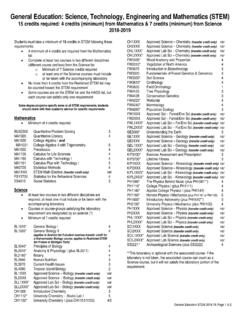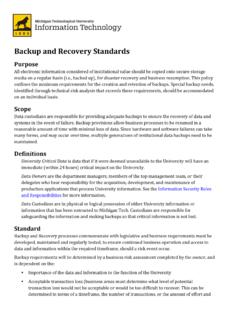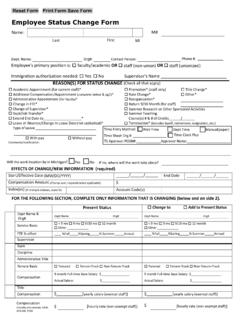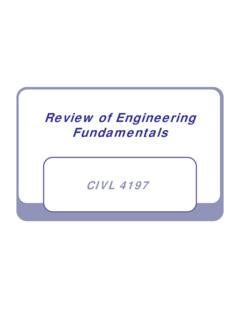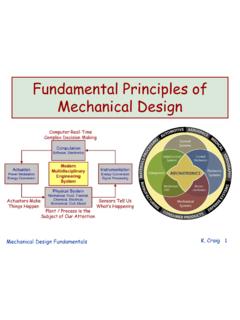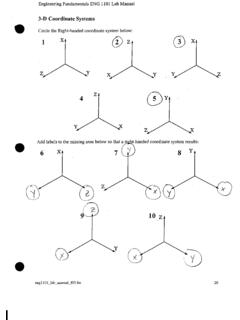Transcription of Bachelor of Science in Engineering prepared by Department ...
1 Bachelor of Science in Engineering Degree Program Student Guide prepared by Department of Engineering fundamentals College of Engineering Michigan Technological University Houghton, MI 49931 May 2017 _____ BSE Student Guide, May 2017 Page 1 of 20 Bachelors of Science in Engineering Michigan Technological University A. EDUCATIONAL PHILOSOPHY OF THE BSE PROGRAM The Bachelor of Science in Engineering (BSE) degree program is an Engineering degree path that has the flexibility to offer programs in niche or emerging areas, or to tailor a program to fit your specific career goals when they do not fit within one of Michigan Tech s disciplinary Engineering programs. Your courses are uniquely combined to provide you with the specialized Engineering education you desire or need to meet your goals.
2 The curriculum includes an Engineering fundamentals Core, a Technical Emphasis, and a set of Directed Electives, along with the required courses in math and basic sciences, Michigan Tech s General Education program, and free electives. Courses for the Technical Emphasis are taken from one or more of the departments within the College of Engineering , and occasionally from other academic units. These courses, when blended with courses for the Directed Electives, allow student choices and options for a minimum of 35 credits. And, choices for the General Education electives and free electives offer even more flexibility. The BSE undergraduate degree program is accredited by the Engineering Accreditation Commission of ABET, 415 North Charles Street, Baltimore, MD 21202, telephone: (410) 347-7700.
3 B. EDUCATIONAL OBJECTIVES OF THE BSE PROGRAM The educational objectives of the BSE program are broader than those of the other Engineering programs offered at Michigan Tech. The post-degree opportunities in employment and education are varied due to the flexible nature of the BSE curriculum. While some paths are defined (Geospatial Engineering , Systems Engineering , and Mining Engineering ), the program offers you the ability to tailor your courses (under the guidance of an academic advisor and with required approval of the BSE Governance Committee) to meet specific career or preparatory goals. The educational objectives for the program are listed below in Table 1. _____ BSE Student Guide, May 2017 Page 2 of 20 Table 1.
4 The Educational Objectives of the Bachelor of Science in Engineering Degree program. _____ Bachelor of Science in Engineering graduates are prepared to accomplish the following objectives: 1. Join, or break ground in establishing, a workforce in an emerging or blended discipline of Engineering ; and 2. Secure employment in a profession or field for which an undergraduate Engineering education is an asset; or 3. Gain admission to and successfully complete a graduate program in an Engineering discipline or in another field for which an Engineering undergraduate degree is recognized as appropriate preparation for graduate work. _____ C. EDUCATIONAL OUTCOMES OF THE BSE PROGRAM In order to ensure that you, as a graduate of this program, will be able to attain the objectives in Table 1, the BSE curriculum has program outcomes that all students will, before they graduate, attain.
5 These outcomes are provided in Table 2. Table 2. Program Outcomes for BSE students. Taken from 2017-2018 ABET Criterion 3 a-k ( #outcomes accessed on May 5, 2017). a An ability to apply knowledge of mathematics, Science , and Engineering b An ability to design and conduct experiments, as well as to analyze and interpret data c An ability to design a system, component, or process to meet desired needs within realistic constraints such as economic, environmental, social, political, ethical, health and safety, manufacturability, and sustainability d An ability to function on multidisciplinary teams e An ability to identify, formulate, and solve Engineering problems f An understanding of professional and ethical responsibility g An ability to communicate effectively h The broad education necessary to understand the impact of Engineering solutions in a global, economic, environmental, and societal context i A recognition of the need for.
6 And an ability to engage in life-long learning j A knowledge of contemporary issues k An ability to use the techniques, skills, and modern Engineering tools necessary for Engineering practice _____ BSE Student Guide, May 2017 Page 3 of 20 D. CURRICULAR STRUCTURE OF THE BSE PROGRAM The basic curriculum of the BSE degree program is provided in Table 3. It consists of five structured components: General Education, Mathematics and Basic Sciences, an Engineering fundamentals Core, a Technical Emphasis, and an approved set of Directed Electives. In Table 3, the total number of credits (127) reflects a minimum requirement of credits for the BSE degree. The five structured curricular components and their credit distributions are discussed in the subsections that follow.
7 Table 3. The basic curricular structure of the BSE degree program. _____ General Education credits (requirements: University 24, BSE 3) 27 Mathematics and Basic Sciences credits 32 - 33 Engineering fundamentals Core credits* 26 - 27 Technical Emphasis credits* 22 - 23 Directed Electives credits 12 - 13 Free Electives credits 3 - 6 Total = 127 credits (minimum) * A minimum of 48 Engineering credits is required from the combined Engineering fundamentals Core and Technical Emphasis. _____ The flexibility of the BSE program is provided through choices (41 credits minimum) in Technical Emphasis credits, Directed Electives credits, and Free Electives.
8 It is balanced by required courses in the Engineering fundamentals Core, mathematics, and basic sciences (a combined 61 credits minimum) to ensure that the fundamental essence of an Engineering education is provided, and to ensure that you will be able to successfully navigate the upper-level courses that are part of your Technical Emphasis and Directed Electives. Additionally, the General Education requirement contains two core courses (6 credits), one humanities or fine arts core elective (3 credits), one social or behavioral sciences core elective (3 credits), and selections from a list of approved humanities, arts, and social sciences (HASS) courses (12 credits). The core electives and HASS classes can be chosen to edify the focus of your curricular path. 1. General Education as defined by the University The General Education program is required for all baccalaureate degrees at Michigan Tech and has four components.
9 It begins with two common core courses and two elective core courses designed to broaden your appreciation of diverse ways of thinking about problems, cultures, and behaviors, _____ BSE Student Guide, May 2017 Page 4 of 20 as well as to provide a forum within which communication skills can be enhanced. These core courses are followed by HASS courses. In addition to the General Education required courses, BSE students must take either EC2001 (Principals of Economics) or EC3400 (Economic Decision Analysis). Though EC2001 and EC3400 are on the General Education Core and HASS lists, they are not counted toward General Education requirements for BSE students; rather, one of the two is required for BSE students as part of the Engineering fundamentals Core.
10 The third General Education component is a STEM ( Science , technology, Engineering , and math) component. All aspects of this component are met within the required math and Science courses for the BSE degree. The fourth component of General Education is a co-curricular activity requirement that is usually satisfied by physical education activities, but it also includes some ROTC activities and some musical performance groups as options. These activities are often taken in half-unit increments to meet the three-unit requirement. The units earned do not count in the overall degree-credit requirements nor in GPA calculations since they are not credits. Taking all this into account, the courses added to the BSE degree by the General Education program are listed below. General Education Common Core Courses: UN1015 Composition 3 UN1025 Global Issues 3 General Education Core Elective Courses: Humanities or Fine Arts Elective 3 Social or Behavioral Sciences Elective 3 Humanities, Arts, and Social Sciences (HASS) Courses*: HASS Communication and Composition Course 3 HASS Humanities and Fine Arts (HU/FA) 3 HASS Social and Behavioral Sciences (EC/PSY/SS) 3 HASS Course from any list 3 Co-Curricular Activities.
